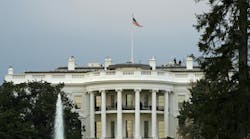A legislative battle is shaping in the US Congress over whether more regulatory oversight of energy markets is needed in the wake of the Enron Corp. financial debacle, according to US officials and industry lobbyists.
In a series of congressional hearings over the past few weeks, some lawmakers-mostly Democrats led by Rep. John Dingell (D-Mich.), the ranking member of the House Committee on Energy and Commerce-have called for sweeping changes to existing laws.
"Enron, the seventh largest company in the nation, a darling of Wall Street and a publicly held company, failed-taking with it the incomes, savings, and dreams of its employees. This committee, and the Congress, has a duty to find out what happened. We may find that the scandal isn't just what was illegal. An even bigger scandal may have been what was legal," Dingell said before a Feb. 7 hearing in which former senior Enron executives were called to testify.
"Whether it is the company or the system, we need to look at changes to make sure this does not happen again," said Peter Deutsch (D-Fla.).
Pending legislative proposals include a bill to merge the Commodities and Futures Trading Commission (CFTC) back into the Securities and Exchange Commission and a plan to increase regulation of over-the-counter (OTC) energy derivatives.
Some lawmakers flatly disagreed that more laws are needed to prevent corporate meltdowns like Enron's. "We can legislate this until hell freezes over, and it could still happen," said Rep. Cliff Stearns (R-Fla.) at the Feb. 7 Energy and Commerce oversight hearing.
However, most Republican lawmakers are taking a wait-and-see attitude. Billy Tauzin (R-La.), Energy and Commerce Committee chairman, said the problem may lie in how existing laws are enforced.
"We have found substantial evidence of illegal activity by Enron and its management," Tauzin said on Feb. 6. "This activity served to deceive the public about Enron's financial condition. It artificially pumped up Enron's stock price and allowed these same executives to enrich themselves with sales of Enron stock.
"We have learned that the SEC conducted no meaningful review of Enron disclosures from 1997 to 2001. So before we rush to impose new laws and regulations in the wake of this scandal, we will want to be sure that we are actually enforcing existing law."
Meanwhile, analysts said dramatic "fixes" to the Enron problem may not be easy to legislate. "Our opinion is that we expect something to be done about derivatives regulation, but merging the SEC and CFTC is unlikely to be it," said Steve Blumenthal, financial analyst with Schwab Capital Markets LP.
Whether SEC should regulate derivatives is also controversial. Wall Street is wary because if "regulate" means that derivatives would be treated like securities, they would have to be registered. That in turn could mean time delays and increased costs for companies entering those contracts, Blumenthal said.
Another question is whether all OTC derivative dealers, including nonfinancial companies like Enron and their competitors, would have to be registered and regulated by the SEC. If SEC is given that authority, it will need more staff and more money to do the job right, Blumenthal said.
What steps Congress takes next remain unclear, said lobbyists. One immediate action Congress may pursue is to give SEC a bigger enforcement bud- get. For fiscal 2003, President George W. Bush proposed a 4% increase for the agency from $438 million in 2002, but most of that money is earmarked for technology, not enforcement.
SEC sources said they asked the White House for an additional $500 million but were turned down. Democratic lawmakers said earlier this month they want to give SEC more money.
"I am frankly astonished that the president's FY 2003 budget fails to address the funding crisis at the SEC," said House Committee on Financial Services ranking member John LaFalce (D-NY).
"Where a budget increase of up to approximately $200 million for staff and enhanced enforcement is clearly warranted, particularly in the wake of Enron's collapse, the largest bankruptcy in American history, the president's budget is a paltry increase that fails to recognize the extraordinary challenges the SEC faces in a marketplace that is more complex than ever."
Other issues
The New York Mercantile Exchange has proposed that Congress undo exemptions used by EnronOnline, Enron's former trading platform, through the recently enacted Commodity Futures Modernization Act.
Under CFMA, NYMEX maintained that its competitors that use proprietary electronic bulletin boards instead of a traditional open cry system for oil, gas, or electric power trades receive a competitive advantage.
NYMEX said that's because the law allows internet-based trading platforms such as Atlanta-based IntercontinentalExchange (ICE) to avoid the same reporting requirements NYMEX must follow.
Those who support the exemption said it does not discriminate against the exchange because NYMEX also could establish a competing electronic trading system. Also, supporters argued that the rule still gives CFTC the authority to levy penalties in the case of fraud. But NYMEX said shielding energy products from the same disclosure requirements as a traditional open cry system could lead to "rogue" trades that are outside the scope of most federal regulation and ultimately may damage the integrity of energy markets.
The administration does not seem convinced by NYMEX's argument, although support in Congress could build, depending on how long the political fallout from Enron lasts, policy-makers said.
But for now at least, CFTC Chairman James Newsome said Enron's problems appear to be isolated and do not necessarily mean changes are needed. "I was a supporter of the CFMA," he told the Senate Committee on Energy and Natural Resources. "At this time, we have no indication that manipulation of any on-exchange futures market was attempted by Enron (OGJ Online, Jan. 29, 2002)."
Meanwhile, Senate Judiciary Chairman Patrick Leahy (D-Vt.) wants Congress to reconsider changes to the Private Securities Litigation Reforms Act made in 1995. The law was intended to prevent frivolous lawsuits by shielding accountants and lawyers from civil actions in private security fraud.
Leahy argued at a Feb. 5 hearing that the law in its present form has been abused by some accountants to "create an environment in which creative accounting can morph into off-the-books maneuvering that is destroying pensions and savings and threatens to cut the heart of investor confidence."
Broader financial implications
Tauzin said his committee is studying the broader implications for financial markets of Enron's collapse.
Energy companies of late have been plagued by what Wall Street analysts call "Enron-itis," or the fear that companies are not being completely forthright in their financial disclosures.
In light of this crisis of confidence, Congress may consider changing the way companies are allowed to measure profit. In the US, assets common to energy companies such as marketable securities, derivatives, and financial contracts are required to be reported on the balance sheet at their current market values, rather than their original acquisition cost. This method, known as mark-to-market (MTM) accounting was used perhaps too aggressively by Enron, Rice University professor of management Bala Dharan said Feb. 6 before Tauzin's committee.
A major problem with using MTM accounting for the kind of electricity trades Enron executed was that regulators found it nearly impossible to verify the true value of those contracts. Enron often forecasted or assumed values for several dozen variables that lasted several years into the future, Dharan said.
"For example, the revenue forecasts may depend on assumptions about the exact timing of energy deregulation in various local markets, as well as 20 years of forecasts for demand for electricity, actions of other competitors, price elasticity, cost of gas, interest rates, and so on," he said.
Meanwhile, the administration is stepping up interagency efforts on Enron and energy markets in general. The White House last month announced an interagency task force overseen by the Department of Justice.
The Federal Energy Regulatory Commission, in conjunction with the Federal Trade Commission and CFTC, plan to investigate national electricity and natural gas with a special emphasis on California and the Pacific Northwest. FERC also is seeking to establish a new interagency task force that would keep regulators updated on new business models that may impact the volatility of energy markets (OGJ Online, Feb. 8, 2002).
And at the SEC, the agency wants accountants, through a new independent oversight board, to be more aggressive about disciplining auditors who try to hide accurate financial statements for clients. However, SEC may need to consider doing more.
This could include tighter controls on MTM and similar accounting methods, suggested John Olson, research director for Sanders Morris Harris Investment Services. "The accounting [on Enron] is as flaky as it gets," he said.
And for the moment SEC's responses are not convincing some in Congress that the agency can fix things on its own.
"The Enron experience has landed on our doorstep, and our job is to make sure that there are adequate doses of accountability in our legal system to prevent such debacles in the future and to offer a constructive remedy if there are not," Leahy said.

